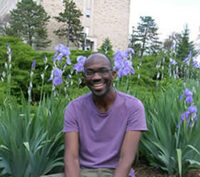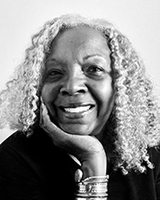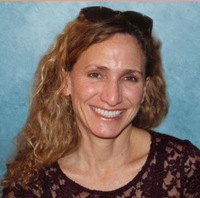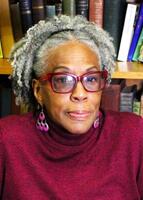-

Glen Layne-Worthey is Associate Director for Research Support Services in the HathiTrust Research Center, based in the University of Illinois at Urbana-Champaign School of Information Sciences. Formerly, he was Digital Humanities Librarian at Stanford, 1997-2019, and was founding head of Stanford’s Center for Interdisciplinary Digital Research (CIDR). He’s held many roles in the international digital humanities community and is currently Chair of the Alliance of Digital Humanities Organizations (ADHO) Executive Board. His graduate work was in Russian children’s literature at the University of California, Berkeley.
-

Dr. Harold Torrence is a professor in the UCLA Department of Linguistics, where he also received his Ph.D in 2005. His research focuses on the comparative syntax and morphology of African and Native American languages. He is currently Co-PI on two research projects. The first project, with Jason Kandybowicz (of the CUNY Graduate Center), titled “Training and Text Collection as a Vehicle for Recruiting and Retaining Endangered Language Fieldworkers”, involves training students to conduct fieldwork through hands-on, up-close work with native speakers of endangered and understudied languages spoken in Ghana. The second, with Ivano Caponigro (UCSD) and Roberto Zavala (CIESAS San Cristóbal), describes and documents the morpho-syntax and semantics of headless relative clauses in Mesoamerican languages.
Some recent publications from Dr. Torrence include:
African Linguistics on the Prairie: Selected Papers from the 45th Annual Conference on African Linguistics.. (with Philip Duncan, Jason Kandybowicz, Travis Major). Language Science Press.
Africa’s Endangered Languages: Documentary and Theoretical Approaches. (with Jason Kandybowicz). Oxford University Press.
“Africas-Endangered-Languages-An-Overview”. (with Jason Kandybowicz). Introductory chapter in Africa’s Endangered Languages: Documentary and Theoretical Approaches. Oxford University Press.
“The-Role-of-Theory-in-Documentation: Intervention Effects and Missing Gaps in the Krachi Documentary Record” (with Jason Kandybowicz). In Africa’s Endangered Languages: Documentary and Theoretical Approaches. Oxford University Press.
-

Irma McClaurin (https://linktr.ee/dr.irma) is an activist anthropologist, the Culture and Education Editor for Insight News, a columnist, and occasional radio and television commentator and recently appeared in the PBS American Experience documentary “Zora Neale Hurston: Her Own Way.” She is the CEO and senior consultant for Irma McClaurin Solutions, a past president of Shaw University, and former Associate VP at the University of Minnesota and founding ED of UROC. Recognition includes 2023 Honorary Degree from Grinnell College, 2021 American Anthropological Association’s Engaged Anthropology Award, 2015 “Best in the Nation Columnist” by the Black Press of America, and 2002 “Outstanding Academic Title” for Black Feminist Anthropology: Theory, Politics, Praxis and Poetics. McClaurin is a digital author on Medium and for Ms. Magazine. Her collection, JustSpeak: Reflections on Race, Culture & Politics in America, is forthcoming in 2023, and she is working on a book length manuscript entitled “Lifting Zora Neale Hurston from the Shadows of Anthropology.”
-

Jessica Parr (she/they) is a professor of the Practice in History at Northeastern University. They are a historian of the Early Modern Atlantic, specializing in race and memory long eighteenth century, as well as in digital humanities, and archival studies. They are the author of Inventing George Whitefield: Race, Revivalism, and the Making of a Religious Icon (U. Press of Mississippi). The book explores Whitefield’s development as a symbol shaped in the complexities of revivalism, the contest over religious toleration, and the conflicting roles of Christianity for enslaved people. Evangelical Christianity’s emphasis on “freedom in the eyes of God,” combined with the problems that the rhetoric of the Revolution posed for slavery, also suggested a path to political freedom.
Dr. Parr received their M.A. and Ph.D. in History from the University of New Hampshire at Durham. They hold a B.A and M.A. in History as well as their M.S. in Archives Management from Simmons College.
-

Julian C. Chambliss is a Professor of English and the Val Berryman Curator of History at the MSU Museum at Michigan State University. In addition, he is the faculty lead for the Department of English Graphic Possibilities Research Workshop and a core participant in the MSU College of Arts & Letters’ Consortium for Critical Diversity in a Digital Age Research (CEDAR). His research interests focus on race, culture, and power in real and imagined spaces. His recent writing has appeared in Scholarly Editing, Genealogy, KULA: Knowledge Creation, Dissemination, and Preservation Studies, and The Conversation US.
As an interdisciplinary teacher and scholar concerned with real and imagined spaces, Dr. Chambliss integrates a historical understanding into investigations of contemporary culture.
His work is framed around a central question: What does it mean to be a scholar in the twentieth-first century? Informed by a community engagement framework that emphasizes the Classroom as Platform, Dr. Chambliss pursues a public humanity practice that supports student learning and community action.
-

Marta Caminero-Santangelo is a University Distinguished Professor and Chair of the English Department at the University of Kansas. Her research and teaching focuses on 20th and 21st century U.S. Latino/a/x literary studies. Her books include Documenting the Undocumented: Latina/o Narrative and Social Justice in the Era of Operation Gatekeeper (2016), On Latinidad: US Latino Literature and the Construction of Ethnicity (2007), and The Madwoman Can’t Speak: Or Why Insanity Is Not Subversive (1998). She is the incoming editor of the journal Latino Studies and is currently working on a book about Latino/a/x literature of the Heartland. She earned a BA from Yale University and a Ph.D. from the University of California, Irvine. She is a child of Cuban immigrants.
-

Najarian R. Peters joined the KU Law faculty in summer 2020. Peters teaches torts as well as two privacy courses she created: Privacy Law and The Practice of Privacy Law. Peters’ work and scholarship focuses on privacy policy, law, governance, and emerging technology. Peters is a Faculty Associate at the Berkman Klein Center for Internet & Society at Harvard Law School. Prior to joining the KU Law faculty, she was the Inaugural Faculty Fellow and Assistant Professor of Law at the Institute for Privacy Protection at Seton Hall Law School where she was the architect of its structure, operations and program portfolio. In 2020, Peters created PrivacyPraxis, an annual conference that brings together scholars, practitioners, and advocates from a cross-section of disciplines to discuss privacy law and policy. Peters’ scholarly articles have been published in the 5Rights Foundation/Digital Futures Commission, Michigan Journal of Race & Law, University of California Law Review, Washington & Lee Law Review, and Seton Hall Law Review. Peters has three books forthcoming. Her first monograph will be published by University of California Press, in January 2024 and is titled Marronage and Modernity: Privacy, Technology, and Black Liberation. Additionally, Peters is the author of a forthcoming treatise on Kansas Tort/Personal Injury Law with Lexis Nexis Publishing and is the co-author of a forthcoming case-book tentatively titled Race and Privacy with West Publishing. Peters was named a co-principal investigator in 2021 for the Stories For All grant funded by The Andrew W. Mellon Foundation. The grant funds her first work in the digital humanities titled The Jurisprudence and Child Privacy Praxis of Black and Native Home Education.
Peters earned her J.D. at Notre Dame Law School where she created and taught the seminar in the Center for Social Concerns, Environmental Human Rights in the Aftermath of Hurricane Katrina and was the recipient of the Joseph Ciraolo Memorial Award and Africana Studies Book Award. She received her B.A. at Xavier University of Louisiana.
-

Dr. Nazera Sadiq Wright is Associate Professor of English and African American and Africana Studies at the University of Kentucky. She is the author of Black Girlhood in the Nineteenth Century (University of Illinois Press, 2016), which won the 2018 Children’s Literature Association’s Honor Book Award for Outstanding Book of Literary Criticism. Her Digital Humanities project, DIGITAL GI(RL)S: Mapping Black Girlhood in the Nineteenth Century documents the cultural activities of black girls living in Philadelphia in the nineteenth century. In 2019, she was elected to the American Antiquarian Society. Fellowships through the Ford Foundation, the National Endowment for the Humanities, the Andrew W. Mellon Foundation, and the Bibliographical Society of America funded archival research for her second book, Early African American Women Writers and Their Libraries.
Research Project: "Early African American Women and their Libraries"
-

Randal Maurice Jelks is Professor of African and African American Studies and American Studies. He is an award winning author and a documentary film producer. His books are African Americans in the Furniture City: The Struggle for Civil Rights Struggle in Grand Rapids, Benjamin Elijah Mays, Schoolmaster of the Movement: A Biography, Faith and Struggle in the Lives of Four African Americans: Ethel Waters, Mary Lou Williams, Eldridge Cleaver and Muhammad Ali and Letters to Martin: Meditations on Democracy in Black America. Jelks has recently contributed to a collection of essays titled 42 Today: Jack Robinson and His Legacy edited by Michael Long. His essays have appeared in the Boston Review, the Los Angeles Review of Books, and Truthout as well as other national blogs, journals, magazine and newspapers.
-

Robert C. Schwaller is an Associate Professor of History and Director of Graduate Studies at the University of Kansas. His research focuses on the development of race in Latin America and the experiences of Africans, their descendants, and indigenous peoples. His current project, tentatively entitled Maroon Conquests, examines the earliest instances of marronage (slave flight) in Hispaniola, Panama, and Mexico. Professor Schwaller is currently on the executive committee of the Latin American Area Studies Program. In 2012, he was recognized by the Center for Teaching Excellence as a Celebration of Teaching Honoree. His courses focus on the history of Latin America, specifically the colonial period and issues of race.
-

Robert Warrior is Hall Distinguished Professor of American Literature and Culture at KU, where he teaches in English and American Studies as well as at Haskell Indian National University in Lawrence. A member of the Osage Nation, his main areas of interest are Indigenous studies, Native American literary studies, and Indigenous social movements. Among his books are The People and the Word: Reading Native Nonfiction, Like a Hurricane: The Indian Movement from Alcatraz to Wounded Knee, Tribal Secrets: Recovering American Indian Intellectual Traditions, and American Indian Literary Nationalism.
-

Sandra G. Shannon, PhD, is professor emerita of African American literature in the Department of English at Howard University. She is widely acknowledged as a major scholar in the field of African American drama and the leading authority on playwright August Wilson. She is the author of the books The Dramatic Vision of August Wilson and August Wilson’s Fences: A Reference Guide, has written numerous essays and chapters on Wilson. She has also served as editor of the College Language Association Journal (CLAJ) and as editor of several essay collections, including Modern American Drama: Playwriting in the 1980s and August Wilson’s Pittsburgh Cycle: Critical Perspectives on the Plays. She is currently Dean of the College of Fellows of American Theater, President of the August Wilson Society, Scholar-in-Residence at Pittsburgh, PA’s August Wilson African American Cultural Center, and a Scholar Coach for Howard University’s 2023 Junior Faculty Writing and Creative Works Summer Academy.
In fall 2020, Dr. Shannon successfully applied for and received a generous grant on behalf of the August Wilson Society from the Billie Holiday Theatre sponsored Black Seed initiative to support a two-year project titled Centering and Celebrating Wilsonian Warriors. This project, now based at the University of Pittsburgh, will examine the roles played by an August Wilson-centered community of actors, designers, musicians, and directors in securing the playwright’s current national and international reputation as one of the greatest playwrights of our time.
A sample of her scholarship can be found at https://works.bepress.com/sandra-shannon/
-

Shanna L. Smith is an Associate Professor in the Department of English, Foreign Languages, and Speech Communication at Jackson State University. Smith specializes in African American Literature and Culture, and Oral History with research interests in African American women’s literature, social justice in young adult fiction, and oral history. Her most recent publications are found in Obsidian, The Researcher, POMPA, Black Bone: Twenty-Five Years of the Affrilachian Poets, and Black Lives Still Matter.
-

Dr. Tiera Tanksley is an Assistant professor of Equity, Diversity, and Justice in Education at the University of Colorado Boulder. Her scholarship, which theorizes a critical race technology theory (CRTT) in education, extends conventional education research to include sociotechnical and techno-structural analyses of artificially intelligent technologies. Specifically, Dr. Tanksley’s research examines anti-Blackness as “the default setting” of digital technology and examines the socioemotional and academic consequences of algorithmic racism in the lives and schooling experiences of Black youth. Her work simultaneously recognizes Black youth as digital activists and civic agitators and examines the complex ways they subvert, resist and rewrite racially biased technologies to produce more just and joyous digital experiences for Communities of Color across the diaspora.
Dr. Tanksley’s scholarship has been awarded several competitive grants in computer science and engineering, including an NSF grant to support her work on race, technology, and decolonial engineering in a global context, and an Engineering and AI-Augmented Learning grant for her work on designing race-conscious and justice-oriented technologies with Black youth. In 2022, Dr. Tanksley received the Emerging Leader in Critical Race Technology Studies Fellowship from UCLA.
-

Tyechia Thompson is an Assistant Professor of English at Virginia Tech whose areas of research include African American literature, digital humanities, and manuscript and archival studies. She is the creator of “Baldwin’s Paris,” a geospatial literary tool that maps over 100 references that James Baldwin made to places in Paris. She is the instructor and executive producer of the mobile application “Hip Hop Lit” in the Apple App Store. She is the recipient of an NEH-Mellon Fellowship for Digital Publication supporting the project “Place, Memory, Poetry, and the James A. Emanuel Papers at the Library of Congress.” She co-creator and co-host of the podcast The Inside Story, funded by an American Council of Learned Societies Digital Justice Seed Grant for the project “Building an Institute for Empathic Immersive Narrative.” She has published in Digital Humanities Quarterly, Afro-Publishing Without Walls/IOPN, Fire!!!: The Multimedia Journal of Black Studies, and the College Language Association Journal.
-

Professor William Gibbons is a librarian and archivist at The City College of New York, where he teaches urban policy, library science, and archival studies. His scholarly interests include literacy and critical thinking, Harlem and gentrification, youth athletics, and the preservation and accessibility of archival and special collections.
Professor Gibbons has fostered partnerships between The City College of New York and organizations throughout Harlem and beyond, including the New York Public Library’s Schomburg Center for Research in Black Culture, Harlem Little League Baseball, and the Rockefeller Archive Center. Through his teaching and projects, he helps families and students within the Harlem community and The City University of New York recognize the value of libraries and become knowledgeable library users who utilize libraries and archives to their fullest potential.
Professor holds a M.A. in Library and Information Science from Pratt Institute, a M.S. in Public and Urban Policy from The New School for Social Research, and a B.A. in Liberal Arts from the University of Michigan.
-

Dr. Sheila Smith McKoy (BA- North Carolina State University, MA-University of North Carolina, Chapel Hill, Ph.D.- Duke University) is Vice Provost of Equity, Inclusion, and Faculty Excellence at the University of San Francisco. As a trained mediator, Smith McKoy also specializes in restorative justice praxis. A former provost, Dr. Smith McKoy has served in leadership positions at numerous universities. In 1994, Smith McKoy was the first African American to earn a Ph.D. in English from Duke University. She is widely published in the areas of race and difference, mentorship, literature and culture, and mentorship. Her books include the seminal text understanding white race riots When Whites Riot: Writing Race and Violence in American and South African Cultures, which has been continuously in publication since 2001. She is co-editor of Teaching Literature and Writing in Prisons and Recovering the African Feminine Divine in Literature, the Arts, and Performing Arts: Yemonja Awakening (2020). She is the editor of The Elizabeth Keckley Reader: Writing Self, Writing Nation (2016) and The Elizabeth Keckley Reader: Artistry, Culture, and Commerce (2017). In addition to her scholarly work, Smith McKoy is an award-winning poet, fiction writer, and filmmaker. She is the recipient of the 2020 Muriel Craft Bailey Memorial Prize in poetry. She is the Co-author of an award-winning anthology, One Window’s Light: A Haiku Collection., an anthology written by five Black poets. She values the art of storytelling in the process of institutional and social change. Her poetry collection, The Bones Beneath, is forthcoming from Black Lawrence Press in 2024. Smith McKoy has also written, produced, and directed three films including Maama Watali and Luwero: A Conversation about War, Peace, and Gender (2017).
-

David Bamman is an associate professor in the School of Information at UC Berkeley, where he works in the areas of natural language processing and cultural analytics, applying NLP and machine learning to empirical questions in the humanities and social sciences. His research focuses on improving the performance of NLP for underserved domains like literature (including LitBank and BookNLP) and exploring the affordances of empirical methods for the study of literature and culture. Before Berkeley, he received his Ph.D. in the School of Computer Science at Carnegie Mellon University and was a senior researcher at the Perseus Project of Tufts University. Bamman's work is supported by the National Endowment for the Humanities, National Science Foundation, an Amazon Research Award, and an NSF CAREER award.
-

Bettye Parker Smith is an educator, lecturer, and writer on issues related to African American women writers. She most recently served as Executive Provost and Vice President at Tougaloo College before retiring as Provost Emerita. Before assuming this role, she served as Provost/Vice President for Academic Affairs, and Interim President at Dillard University in New Orleans, Louisiana, where she is the first woman to hold these positions. Having completed her administrative roles as Provost/Vice President for Academic Affairs and Interim President, Dr. Parker Smith was a full-tenured professor in the Departments of English and African World Studies at Dillard University.
Before assuming these roles, she completed four years as Vice President and Senior Program Officer for the Florida Education Fund located in Tampa, Florida, and six years at Tougaloo College in Mississippi where she was Vice President for Academic Affairs and Dean of the College. Dr. Parker Smith also served as an administrator and Professor of English at Northeastern Illinois University in Chicago for several years and taught African American Literature at Cornell University in Ithaca, New York. She holds a Ph.D. in African American Studies with a concentration in African American women writers from the Union Institute for Graduate Studies. She has done post-graduate work at Bryn Maw College and Harvard University.
Dr. Parker Smith was recently invited to assist Lincoln University in Missouri in reimagining its School of Arts and Sciences. Among other assignments, she guided departments in reimagining and reconstructing curricula in the institutional review process.
Dr. Parker Smith is co-editor of Sturdy Black Bridges: Visions of Black Women in Literature, the first anthology on Black women writers. This book paved the way for numerous manuscripts later published by Black women writers, some of which she is a contributor to. Dr. Parker Smith is also published and has lectured widely on Black women writers, and issues related to leadership in higher education. As Provost at Dillard, she created the Jubilee Scholars Program, a retention initiative for first-year undergraduate students. Further, she has traveled widely throughout Africa, the Caribbean, South America, and Europe. She resides in Jackson, Mississippi.
-

Ángel David Nieves is a Professor of Africana Studies, History, and Digital Humanities in the College of Social Sciences and Humanities (CSSH) at Northeastern University and is an Affiliate Professor in the Department of English and the School of Public Policy and Urban Affairs. He is currently the Director of the Graduate Program in Public History and Director of Public Humanities in CSSH. Dr. Nieves’s scholarship focuses on the intersections of race, gender, sexuality, social justice, and technology in the U.S. and South Africa, and is at the vanguard of digital history publications and experimental online publishing platforms.
Nieves received his Ph.D. from Cornell University in the history of urban development and Africana Studies. He holds an M.A. in socio-cultural anthropology and Women’s Studies from Binghamton University (SUNY) and a professional Bachelor of Architecture (B.Arch.) degree from Syracuse University.
Dr. Nieves is also the author of An Architecture of Education: African American Women Design the New South (2018/2020) and co-editor of ‘We Shall Independent Be: African American Place-Making and the Struggle to Claim Space in the United States (w/Alexander, 2008), both historical monographs. He recently completed a new volume in the Debates in the Digital Humanities Series (w/Senier & McGrail), People, Practice, Power: Digital Humanities Outside the Center (December 2021).
-

Maryemma Graham is University Distinguished Professor in the Department of English at the University of Kansas. In 1983 she founded the Project on the History of Black Writing, which has been at the University of Kansas since 1999. With 10 published books, including The Cambridge History of African American Literature with Jerry W. Ward, Jr. (2011), The Cambridge Companion to the African American Novel (2004), Fields Watered with Blood: Critical Essays on Margaret Walker (2002), Teaching African American Literature: Theory and Practice (1998), and The Complete Poems of Frances E.W. Harper (1988) and more than 100 essays, book chapters, and creative works, she will publish with support from the Hall Center for the Humanities the translingual volume Toni Morrison: Au delà du visible ordinaire/Beyond the Visible and Ordinary with co-editors Andrée-Anne Kekeh (Université Paris 8) and Janis A. Mayes (Syracuse University) in 2014 and The House Where My Soul Lives: The Life of Margaret Walker in 2015. Her public humanities initiatives and international projects since her arrival at KU include The Langston Hughes National Poetry Project, 2002-2005, the Language Matters teaching initiative for the Toni Morrison Society 2003-2010, the Haiti Research Initiative 2011, and “Don’t Deny My Voice,” whose first summer institute on African American poetry was held in 2013. Graham has been a John Hope Franklin Fellow at the National Humanities Center, an American Council of Learned Societies Fellow, a Ford and Mellon Fellow and has received more than 15 grants from the National Endowment for the Humanities. In addition to African American literature and culture, Graham teaches course in genre studies (the novel and autobiography), Inter American Studies (transnationalism, the Global South) and is an active proponent of the digital humanities.
-

Erin Wolfe is the Digital Initiatives Librarian at the University of Kansas, where he works with the Libraries on a variety of tasks involving the creation, access, and preservation of digital materials. His research interests include computational text analysis, text data mining and visualization, machine learning, and related areas.
-

Dana A. Williams is professor of African American literature and chair of the Department of English at Howard University. She is a member of the MLA Executive Council and a past president of the College Language Association and the Association of Departments of English's executive committee. She is the author of In the Light of Likeness--Transformed: The Literary Art of Leon Forrest and editor of Contemporary African American Fiction: New Critical Essays. She has published widely in African American Review, CLA Journal, PMLA, and elsewhere. She is the recipient of five NEH awards, including three recent projects involving DH in African American literature and culture. She is currently completing a book-length study on Toni Morrison's editorship at Random House Publishing Company and is president of the Toni Morrison Society.
-

Jerry W. Ward, Jr.,a retired Professor of English, Richard Wright scholar, and literary critic, lives in New Orleans. He taught for 32 years at Tougaloo College and 10 years at Dillard University.
Among his professional honors are: Kent Fellowship (1975-77); Teacher of the Year Award from Tougaloo College (1992); two UNCF Distinguished Scholar Awards (1981-82 and 1987-88); the Humanities Teacher Award (1995) and the Public Humanities Award (1997) from the Mississippi Humanities Council; the Moss Chair of Excellence in English (1996, University of Memphis); National Humanities Center Fellowship (1999-2000). In 2000, he received the Darwin T. Turner Award of Excellence from the African American Literature and Culture Society. He was inducted into the International Literary Hall of Fame for Writers of African Descent in 2001 and received the Richard Wright Literary Excellence Award from the Natchez Literary and Cinema Celebration in 2011. In 2018, he received the Daryl Cumber Dance Award for Lifetime Achievement from the College Language Association.
Ward is a founding member of the Richard Wright Circle and co-editor of Redefining American Literary History(1990), Black Southern Voices(1992), The Richard Wright Encyclopedia (2008), and The Cambridge History of African American Literature (2011). He edited the anthology Trouble the Water: 250 Years of African American Poetry (Mentor, 1997), and his poems and essays have been published in such journals as The Southern Quarterly, Xavier Review, African American Review, Literature and Medicine, Callaloo, Mississippi Quarterly, and Black Magnolias. His most recent books are THE KATRINA PAPERS: A Journal of Traumaand Recovery(2008), The China Lectures(2014), FRACTAL SONG: Poems(2016), Blogs and Other Writing(2018). His work-in-progress is Richard Wright: An Unending Hunger for Life.
-

Brian Rosenblum is Founding Co-Director of the Institute for Digital Research in the Humanities, and Librarian for Digital Scholarship at the University of Kansas Libraries, where he has administrative, production and outreach responsibilities in support of a variety of digital initiatives and publishing services. Brian is a member of the executive board of Global Outlook::Digital Humanities, a special interest group that works to help break down barriers that hinder communication and collaboration among researchers and students of the Digital Arts, Humanities, and Cultural Heritage sectors in high, mid, and low income economies.
-

Monika Rhue is the Director of Library Services at Johnson C. Smith University. She oversees the library budget, library staff, strategic planning, library accreditation, programming, and grant writing activities.
-

Howard Rambsy II teaches classes on African American and American literature, and he coordinates programs related to African American cultural history and experience. He has published articles about black poetry, Richard Wright, Colson Whitehead, and Aaron McGruder. His book, The Black Arts Enterprise, about the defining African American literary and cultural movement of the 1960s and 1970s, was published by the University of Michigan Press in 2011.
-

Amy E. Earhart is an Associate Professor of English and affiliated faculty of Africana Studies at Texas A&M University. A 2020 Texas A&M University Presidential Impact Fellow and a 2019 Texas A&M University Arts & Humanities Fellow, Earhart has participated in grants and fellowships received from the NEH, ACLS, and the Mellon Foundation. In 2020, Earhart received an NEH-Mellon Fellowship for Digital Publication for her book-length digital project “Digital Humanities and the Infrastructures of Race in African-American Literature.” She has also won numerous teaching awards, including the University Distinguished Achievement Award from The Association of Former Students and Texas A&M University.
Earhart has published scholarship on a variety of digital humanities topics, with work that includes a monograph Traces of Old, Uses of the New: The Emergence of Digital Literary Studies (U Michigan Press 2015), a co-edited collection The American Literature Scholar in the Digital Age (U Michigan Press 2010), and a number of articles and book chapters in volumes including the Debates in Digital Humanities series, DHQ, DSH: Digital Scholarship in the Humanities, Digital Studies/Le champ numérique, and Textual Cultures. Her current book, “A Compromised Infrastructure: Digital Humanities, African American Literary History and Technologies of Identity,” is under advance contract with Stanford University Press.



























